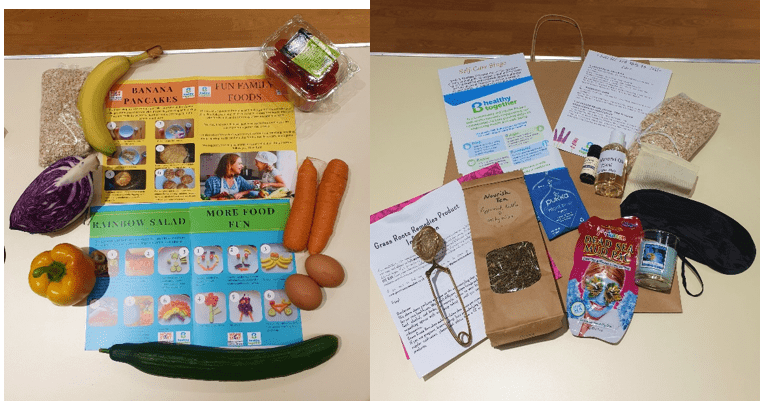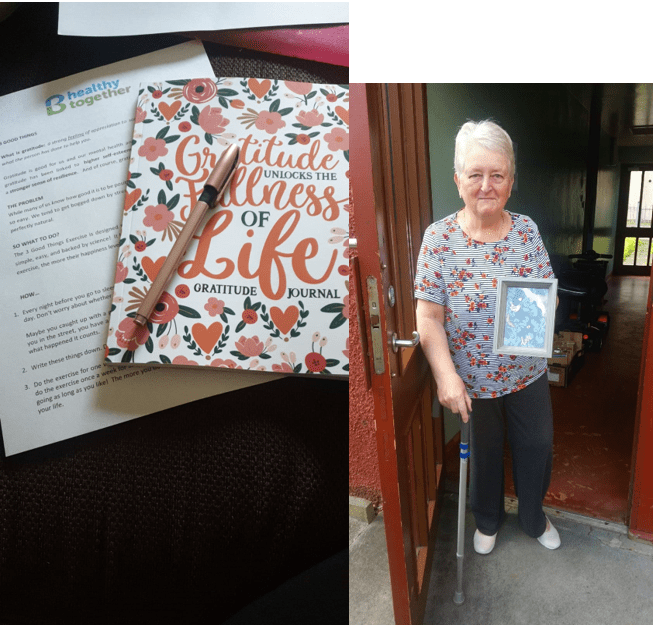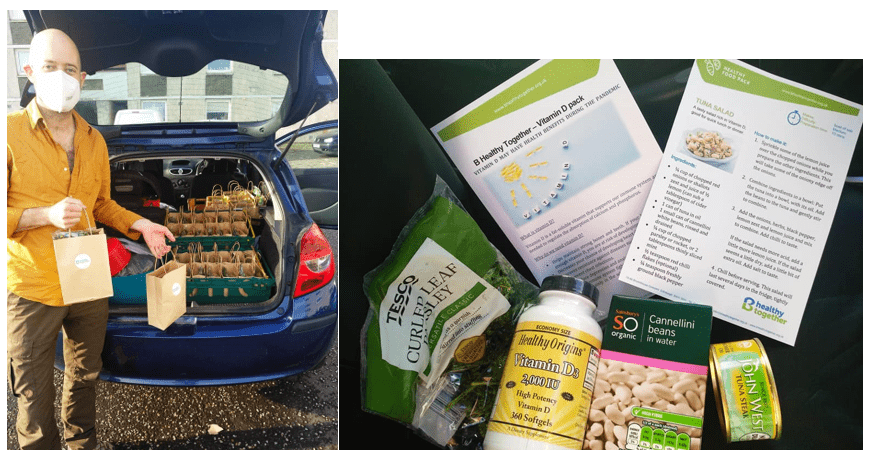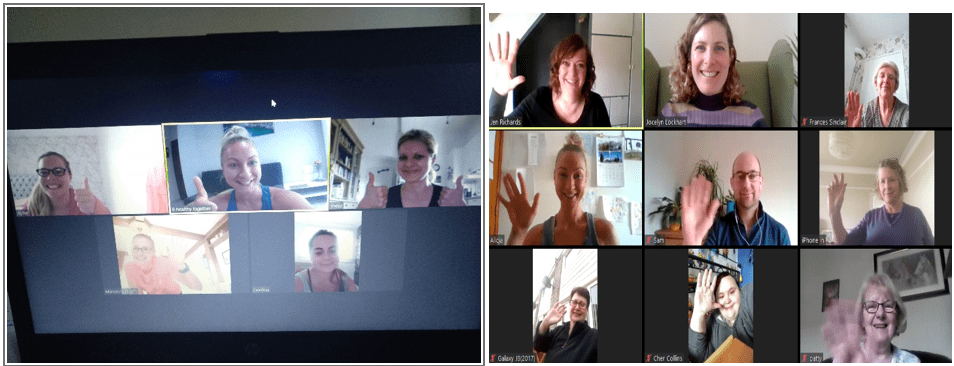Covid 19 Update September 2020
We would like to take this opportunity to give you an insight into what we have been doing to support our community during the Covid19 period to date; we are extremely grateful to Vegware for allowing us to be flexible with our funding to meet the needs of our community during this health crisis. Please find below and update, reflections and a couple of photographs to provide a taste of our work during this pandemic.
Adapted activities update:
- Seated exercise classes: after initially carrying out the classes using social distancing and disinfecting the chairs, following on from Government advice we took the decision to cease our in person method of delivering this activity as the main users of the group are older or have chronic health conditions which put them in the high risk group. We spoke with the tutors of the seated exercise class and the seated yoga classes to see if they would feel comfortable doing a weekly Facebook live class that would enable people to take part at the usual time and also to watch the videos afterwards. Both tutors have embraced this despite being nervous and never having done it before! We continue with this model.
- Buggy Gym, Family Fit classes: we carried out these classes on Facebook live. There has been positive engagement with the mums who usually attend these classes; videos are available to watch online later if unable to attend the lives. Buggy Gym has restarted this week.
- Community Meals: Instead of physical community meals we initially supported emergency food provision in the Calders area. Once larger organisations with the relevant infrastructure took over this, we adapted our support. We worked in partnership with Calder Community Flat committee and Bethany Christian Trust to provide hot meals for distribution on days there was no provision, this latterly moved to the creation and distribution of meal packs for people to make at home.
- Grow, cook. Eat: Unfortunately, due to lockdown we have had to postpone this piece of work. Our Development Worker who was leading on this has maintained contact with the GP surgery with whom we partner and he has kept the garden maintained and replanted veg when safe to do so. We hope to begin introducing volunteers back to the garden again within the next couple of weeks.
- Volunteers: We continued to seek safe opportunities for our current volunteers where appropriate. We had a couple of volunteers who weren’t be able to volunteer due to having special needs children at home and in high risk groups due to health issues.
- Telephone support: We have been regularly calling our most vulnerable service users as a way of checking in with them as a result of this we bought and delivered food to a single mum with a young autistic son who was scared she was running out of money and she was already skipping meals. Due to her son’s autism the food on offer at local services and foodbanks would not be suitable for him as he only eats a limited number of foods. At this point the timeframe for a Tesco’s delivery was 5 – 6 weeks. We’ve also dropped books off at another woman’s door who has very poor mental health and had only just started making small steps back outdoors when the pandemic mean she was back into enforced social isolation. We call our less vulnerable service users on a regular basis and ensure they are coping and use the opportunity to reduce the social isolation a lot of them are currently experiencing.
- Social Media: We have created a schedule of posts onto our social media channels that include food, mental health and wellbeing, exercise, children’s activities, entertainment and other useful subjects we come across. This has been welcomed and we continue to find ways of developing this.
- Zoom Virtual Cuppas: we introduced this weekly social connection to keep in contact with some of our community who weren’t accessing other activities. This was self-led in terms of weekly activities and covered music quizzes, favourite films, positive life story, inspirational quotes and poetry and craft sessions to name a few! We also used this method to keep in contact with the mums who usually attended the Buggy Gym and Baby’s First Food session; this enabled contact and peer support.
Wellbeing at Home Project
During the Covid19 crisis we’ve become aware older people and those classed as vulnerable in our communities are significantly more affected due to social distance and social isolation measures. We’re witnessing a decline in their mental health and wellbeing and anticipate this effect to last longer than younger people. Fear of going out is another significant factor in their lives.
Our aim with the Wellbeing at Home Project is to reconnect these people by reducing their barriers to digital services and deliver activity/information packs related to themes of interest to them. Packs are delivered weekly, providing an opportunity to connect with our team and provide a positive interaction in their week and the opportunity to raise concerns.
We are currently delivering 45 packs per week (we started at 12 per week); themes so far have been growing, food, gratitude, stress relief and relation, Vitamin D, craft and exercise. The feedback we have had has been really positive:
| “It was such a lovely surprise and brightened up my day to think that someone made these up for others to enjoy and try new something new during these times”
|
As restrictions have lifted, we have been able to bring back our volunteers to support with the making up and delivery of the packs. Two of our older community members requested that they deliver some of the packs in their local area; this has enabled them to volunteer and also to reconnect with some of our older and isolated community members.
Operational:
- We quickly took the decision to move the whole staff team to home working and equipped them all to be able to work safely by providing IT equipment, chairs, laptop risers, mobile phone software etc.
- We purchased Zoom software that allows the team to work remotely and be able to have meetings where we can all see, hear and speak to each other. We’ve used this tool to continue our board meetings as per schedule.
- We diverted the office phone to Chief Executives home ensuring we still receive and are able to answer phone calls to the landline number.
Partnership working:
- We are working with other partners in the locality in a network called ‘Going Beyond’ to enable a joined-up approach can be to support our community during the pandemic.
- We continue to be part of ‘Joining the Dots’ (a group of local organisations within the South West Area), this has ensured we have been able to find out what others and doing and share resources where possible.
- We partnered with Calders Community Flat Committee and Bethany Trust to provide food within the Calders Area.
- We partnered with Herbal Remedies to provide over 80 packs of herbal teas to local community members to support their health and wellbeing during this challenging time.
- We partnered with Homestart and provided 50 rest and relaxation packs and 50 fun food packs to local parents.
Key learnings and future challenges:
We continue to adapt to the unique situation in which we find ourselves. Key challenges are the negative impact of lockdown on peoples mental and physical health. There have been significant changes in people’s movements and engagement and in particular, access to support and services. The ways in which people connect have changed considerably over this period; some people have adapted and others are really struggling. The easing of lockdown will change support services further and the potential of any future lockdown will mean we will need to adapt again.
We have ongoing dialogue with those that we support and have adapted our services to reflect their feedback. We continue to try and monitor the changing needs and issues presenting with the community we support. We are gathering evaluation as we move forwards with our Wellbeing at home project.
After the initial dominating issue around food access and insecurity this (for us and those we support) had subsided it began to reveal and ever-increasing mental health crisis appearing on the horizon. The impact of social isolation, lack of support services and the climate of fear has had a significant impact on people’s mental health and wellbeing. The true numbers and costs of this we believe, are yet to truly show. The upcoming Scottish Winter is likely to increase the numbers of people who are experiencing issues relating to their mental health and wellbeing and the impact on their physical health resulting from this should not be underestimated.
In terms of changing needs; individuals have been, and some continue to be, isolated within their homes. This has meant we have had to adapt our service to meet this change in circumstances. We have increased 1-1 telephone support, social media and digital outreach and the development of the B healthy together at home pilot project. The likelihood is that we are going to have to continue a level of 1-1 support that we didn’t usually do prior to the Pandemic alongwith the other means of connecting above; we see the potential for a blended model of in person contact and at distance support.
The challenges all of this has presented have been significant. We have however adapted as best we could; we are all working from home at present and contact with our community has been digital or via the telephone. We are however beginning to make face to face contact with people whilst delivering the Wellbeing at home packs and this is a welcome development.
In terms of how we develop our services to factor in societal changes we would anticipate a medium-term change to remote working, smaller numbers of group activities and smaller numbers of people attending group activities due to restrictions. Further changes are taking the message and activities directly to peoples doors as in the Wellbeing at home project model and digital access; this is especially important for our older community, those shielding and others within the community who were already vulnerable before the Covid19 Outbreak.
I think we all need to recognise the challenges in forward planning in an ever-evolving situation. It is very challenging to predict how people’s situations are going to be or indeed their physical and mental health moving into the future nor their reactions to these. There are still so many unknowns related to Covid19 that are likely to cause further challenges as we go through this year and into the winter of 2021.
In short, we are proud of how we have flexed and responded since the beginning of the Covid19 crisis, we are still engaging with a large number of our community with whom we had contact before the crisis. We welcome the support of all our funders to continue this process of adapting and flexing as and when the need arises to be there for the most vulnerable within our communities.




